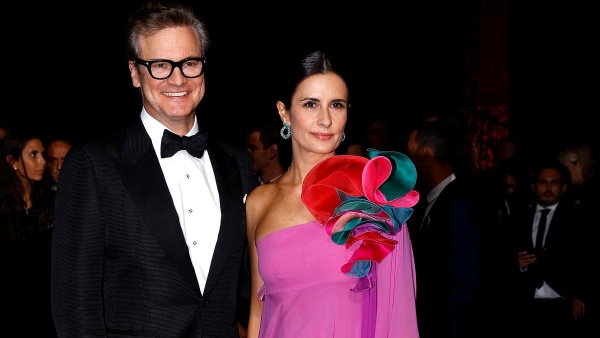
Livia Firth
- Fashion
Why we should ban fast fashion, according to Livia Firth
The Eco-Age co-founder’s mission to make sustainable fashion the norm
Growing up in Italy in the ‘70s and ‘80s, sustainable living wasn’t a hashtag on social media or a way you describe your lifestyle to your colleagues or neighbours, it was just “living,” says Livia Firth. “Back then, consumerism hadn’t really started yet, we were eating local and seasonal food and were wearing quality clothes we saved money to buy and kept them forever – I still have many of them,” she says. It might sound like an old fashioned approach to some, especially in a world fuelled by technology, yet it is one that the Italian-born activist and film-maker swears by.
In 2009 Livia, along with her brother Nicola Giuggioli, founded Eco-Age, a UK-based consulting company that helps brands like Stella McCartney, Chopard and Gucci develop ethical and sustainable supply chains. Earlier this year they launched their second consultancy in Milan, proof there is a huge demand from brands wanting and needing to do better.
Livia’s list of eco-warrior credentials are impressive, to say the very least. She’s A UN Leader of Change award winner, a global ambassador for Oxfam, and for the last decade has been shining a light so brightly on the blinding issues of the fashion industry – most specifically human rights issues and environmental shortcomings – that she’s become somewhat of a sustainability crusader. The impact she has had on raising awareness around social welfare and sustainability in fashion has the kind of reach that’s hard to get your head around.
She also has big-name celebrities in her corner. Vogue powerhouse, Anna Wintour has described the mother of two as ‘fearless’ and her Green Carpet Challenge – which entered the vernacular in 2016 thanks to Emma Watson’s Calvin Klein-designed Met Gala dress made from plastic bottles – set in place a chain of events that would change the way in which people – and celebrity – began to see and to buy fashion. Her husband, actor, Colin Firth is also one of her biggest supporters.
And if that’s not enough of an argument in favour of her dedication to inspire change, the now famous documentary The True Cost, which is used as a reference point by many to explain the urgency of the issue of ethical fashion was, thanks in part, to Livia, who served as the film’s executive producer.

Colin and Livia Firth at the Green Carpet Awards in Milan
Here’s our chat with one of the loveliest and most impressive eco warriors on the planet.
Where does your passion for sustainability come from?
When I realised that what I was taking for granted was actually something that was confined to the “sustainability box”, I started to get passionate about making it a normality. I remember Carlo Petrini, the founder of the Slow Food movement, saying “how did we arrive at an era when we have to certify things that should be normal?”
What’s the sustainable fashion philosophy you live by?
Remember we are all interconnected; the food you eat, the clothes you wear, the things you use every single day, are all produced thanks to a long chain of people. Keep them in mind daily.
What are you doing or would you do to change the fast fashion model?
Ban fast fashion, forever. I grew up without it, everyone over 45 years old grew up without it. It (fast fashion) made fashion disposable and by doing that it’s destroying the environment and enslaving millions of people in its supply chains.
Is Eco-Age everything you wanted it to be, or is there still more to do?
Eco-Age has changed so much over the years. We always adjusted to the times and have been agile with what the issues were and what we needed to highlight and work on as a priority. So Eco-Age is everything I wanted it to be today, but of course there will always be a lot more to do!
What’s something not many people know about you?
That I am quite goofy, I love dancing and never take myself seriously. Never!
What do you love about fashion?
I love the creativity, and when things go in the right direction it makes me feel great! But you will be surprised to know that most days I don’t think about fashion at all.
What are your thoughts on the use of leather and wool versus synthetic ‘vegan’ materials?
This is such a loaded question! I went to the Amazon four years ago to check the leather supply chain and to Tasmania two years ago to check the wool supply chain. I constantly want to learn more and it’s so important to meet the real people on the ground to understand their challenges. Today we have a huge problem with plastic pollution, and thanks to some thorough scientific research, we know that we drink, eat and even breathe plastic. So when you think of it like that, I would say natural fibers over synthetic or plastic every day. But we always need to make sure that animal welfare comes first. The problem is also the enormous quantities we consume today, so we go back to fast fashion and consumerism, which is for me is the root of all evil.
What’s it like running your own company?
I don’t really run it, I am the co-pilot with a brilliant senior management team. My brother Nicola (the CEO), Harriet Vocking (the chief brand officer), Dolly Jones (the chief content officer) and Caroline West (the head of people and culture) make all the decisions together and then we let the most amazingly skilled team of technical consultants, marketing and PR geniuses and event planners do their job. This is when the magic happens.
